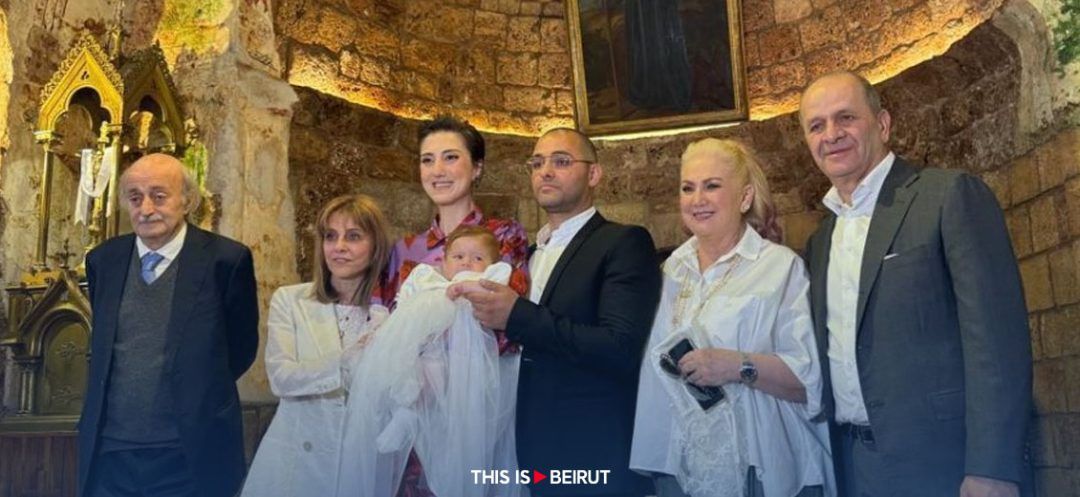
What if, for a Maronite, being Lebanese was simply a way of being Christian? And what if, for a Muslim or a Druze from Lebanon, being Lebanese was just a unique way of being Muslim? Not by abandoning their faith, but by infusing it with a spirit of peaceful, friendly, and inclusive benevolence.
This is the impression conveyed by the photo of Walid Jumblatt and his wife, graciously holding candles and participating in the baptismal procession of their granddaughter, Sophie Jay, at Mar Antonios Kozhaya Church in the Holy Valley. Their daughter, Dalia Joumblatt, married Joey Daher, a man from the North and the son of Pierre Daher, CEO of LBC.
In the church register, the Druze leader expressed his wish that this "blessed baptism" would serve as "a reaffirmation and continuation of the Reconciliation of the Mountain." Orchestrated under his guidance and that of Patriarch Nasrallah Sfeir, this reconciliation in 2001 had bridged the divide between the Maronite and Druze communities, which had been at odds during the years of war.
There has been a noticeable rise in interfaith marriages within the political class in recent years, unequivocally driven by love. These unions signify the maturation of a generation of Lebanese individuals who are breaking free from traditional social and religious constraints.
Thus, among political families, Samy Gemayel, the grandson of Kataeb's founder, Pierre Gemayel, married Carine Tadmouri, a young Sunni girl from Tripoli; Tony Frangieh, son of the Marada leader, married Lynn Zeidan (also Sunni); and the bride's brother, Teymour Jumblatt, married Diana Zeaiter (a young Shiite girl). Within opposition MPs, significant mixed marriages have also taken place. Recently, Marc Daou (a Druze) married Christiana Parreira (a Christian), and Michel Douaihy (Maronite) married Sobhia Najjar (a young Shiite).
Mixed marriages are nothing new, but to an observer, these unions symbolize a societal phenomenon, a broader trend of refusing to let life be solely governed by the dictates of lineage and belonging to religiously-bound communities. Unfortunately, statistics on the percentage of mixed marriages date back to the 1970s and have become less relevant. At that time, they were around 10%. Since then, there have certainly been developments. Indeed, while the old rules persist and differences in education and social class remain, they are gradually diminishing in the wake of societal progress, rural migration, and the decline of illiteracy, particularly among women. Many young couples are now coming together in university lecture halls or corporate settings.
On another note, long before our time, political figures like Kamal Jumblatt placed their hopes in the establishment of mandatory civil marriage to strengthen social ties among Lebanese citizens. However, in the absence of such a law, which religious Islam has vehemently opposed on several occasions, interfaith marriages, as well as civil marriages outside of Lebanon, all of which are in a certain sense marriages of love, can only reinforce the sought-after unity and national solidarity.
French philosopher Luc Ferry describes love marriage as “an invention” of liberal capitalism, attributing it to the creation of optimal economic conditions, enabling privacy, and fundamentally altering our relationships with others. In a recently discounted book available at Librairie Antoine bookstores (*), he notes that even architecturally, “doors and corridors were scarce in European houses before the 18th century, suggesting that the modern concept of intimacy had not yet fully emerged as we understand it today”.
One might thus consider love marriage as a freedom attained through the progress of secularism and the Enlightenment. Undoubtedly, but for Ferry, paradoxically, along with “the logic of love,” have come the pains of divorce and mourning, and it is precisely because of this that the quest for spirituality resonates in the contemporary world.
He asserts that this logic "makes the question of mourning for a loved one, in whatever sense one understands it, whether in the form of separation or death, become the fundamental question, the stumbling block of our secular societies (...). Morality is of no help here. In facing the grief of losing a child, the grief of lost love, morality, and respect for human rights serve absolutely no purpose." "Hence the quest for spirituality that fundamentally animates our contemporaries," affirms this philosopher, always in search of wisdom.
Thus, in a secularized world, the quest for meaning reasserts itself through the enigma of the ultimate ends. But with the richness of our various religious traditions, we are not to be pitied, quite the opposite. Far from prefab answers, love marriages therefore contribute, in their own way, to the building of Lebanon!
(*) Quel devenir pour le christianisme, a debate between Mgr Philippe Barbarin and Luc Ferry, from the "Espaces libres" collection, Albin Michel.
Read more



Comments